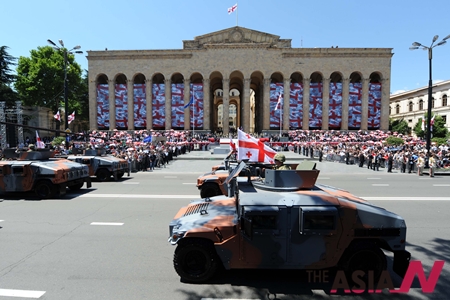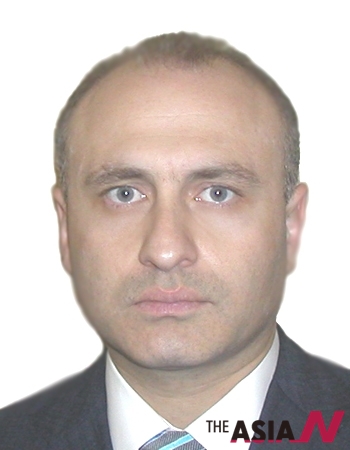Georgia celebrates Independence Day, talks Korean partnership
Independence Day of Georgia
On May 26, Georgia celebrates its Independence Day, commemorating the Act of Independence of 1918, which outlined the main principles of the nation’s democracy and established its first Democratic Republic. After being a part of the former Soviet Union, the country regained its sovereignty on April 9, 1991.
Present-day Georgia is a dynamically developing democratic state. Continuous legislative and economic reforms brought the country a well-deserved image of one of the world’s successful reformers and allowed to eradicate corruption, minimize bureaucracy, improve living standards and create a business friendly environment.
World Bank’s annual report “Doing Business 2015” places Georgia on the 15th position in terms of ease of doing business amongst 189 states. In the Heritage Foundation 2015 Index of Economic Freedom, Georgia scores 73, making its economy the 22nd freest in the world and 11th out of 43 countries in Europe. Georgia’s position improved in five out of the 10 economic freedoms including freedom from corruption, the control of government spending, business freedom, monetary freedom and investment freedom.
According to the World Bank report “Investing Across Borders” (IAB), among the 87 countries under study Georgia is one of the economies most open to foreign equity ownership. Georgia ranks 6th in the list of “Top 10 Safest Countries in the World 2015” made by U.S. lifestyle magazine Presscave (based on the Global Peace Index (GPI) issued by the Institute for Economics and Peace (IEP)). It was named 25th on the New York Times list of 52 places to go in 2015.
Georgia’s government is committed to continue on the path of reforms leading to economic growth and strengthening of the democratic institutions. While modernizing its own economy, Georgia takes an active part in regional and international economic projects aimed at developing infrastructure, interconnecting transport and energy networks, facilitating trade and investments.

Georgian parade march past the parliament building in Tbilisi, capital of Georgia, on May 26, 2010, to mark the Day of Independence of Georgia.<Photo=Xinhua>
Being a reliable partner, Georgia’s importance is gradually increasing as a key logistics and transit element of the Europe-Asia corridor, which significantly cuts the costs and duration of transportation of cargo from Asia to Europe. At the UN General Assembly in 2014, the Prime-Minister of Georgia, Mr. Irakli Gharibashvilili, proposed the establishment of an Annual Silk Road Forum in Tbilisi, where the participants will be able to discuss transport, energy and trade related issues. This initiative closely relates to President Park Geun-Hye’s “Eurasian initiative”, also aimed at development and interconnection of transport and energy systems. Therefore, Georgia welcomes and supports Korea’s intentions and is ready to cooperate in that direction.
The main standing objective of both our internal and external policy remains the issue of territorial integrity. In August 2008, Russian military aggression resulted in occupation of the inalienable Georgian territories of Abkhazia and Tskhinvali region/South Ossetia. Though Georgia’s efforts to normalize its relations with Russia brought some results in terms of increased trade and renewed cultural ties, there is still no progress on the political and human rights issues. In fact, the situation is worsening on a daily basis. Russia conducts military drills in Georgia’s occupied territories and signs illegal treaties with their proxy regimes. Thus it attempts to legitimize the annexation, undermine Georgia’s sovereignty and territorial integrity, and threaten peace and stability in the whole Caucasus region. Our request is legitimate and firm: Russia should fulfill the 6-point Ceasefire Agreement of 2008, and withdraw its troops from Georgia’s occupied regions.
Georgia’s foreign policy priorities and the choice of its people remain resolute and clear – full integration into EU and NATO. The historic signature of the Association Agreement with the EU on 27 June, 2014 marked an important milestone in the EU-Georgia relations and opened a qualitatively new phase in our cooperation. Through gradual establishment of European norms and standards, the Agreement sets our country on the course of political association and economic integration with the EU.
In this context, the Deep and Comprehensive Free Trade Area is particularly important as an integral part of the Association Agreement as it can boost the export of Georgian products to the EU by 12 %, and, in the long run, result in additional GDP growth of over 4 %. It creates opportunities in the biggest and most stable common market, equally accessible by the Georgian and international business. Trade with the EU without tariffs and barriers, and the high level of investment security will further improve the business environment in Georgia. EU is a “peace project” as well, and Georgia’s gradual economic integration should have a positive effect on the regional trade and stability.
We also hope that our intensive cooperation with NATO will soon lead Georgia to a Membership Accession Plan. Among others, our work with NATO is currently focused on establishing a NATO Training Center in Georgia as a part of a package of measures to boost Georgia’s defense capabilities.
Georgia strives to diversify its economic and political partnerships, and to that end its interaction with the Republic of Korea is considered strategic. In 2014 we further developed our bilateral legal framework by signing cooperation agreements in the fields of maritime transport, culture, education, arts, youth and sports. A number of MoU’s on cooperation have already been signed between the Georgian and Korean organizations, including Ministries and business associations.
Our economic and cultural ties are strengthening. Bilateral trade volume has increased significantly as well as the flow of Korean tourists to Georgia. A number of important large-scale infrastructure and energy projects in our country are being implemented by leading Korean corporations. In July 2014, Caucasus Cultural Festival took place in Seoul, where the Korean public had the opportunity to enjoy exciting Georgian folk dance performances and a fascinating photo-exhibition. In turn, Korean musicians and dancers also visited Georgia’s capital with a wonderful performance.
It gives me a great pleasure to note that the Government of the Republic of Korea took the long-awaited decision to open its Embassy in Georgia in 2015. Given the increasing dynamics of our bilateral relations, this was a rather necessary step provided the vast potential for cooperation between our countries. Once the Korean diplomatic mission is settled in Tbilisi, we could double the efforts to strengthen our partnership and the benefits of our bilateral cooperation.

























































